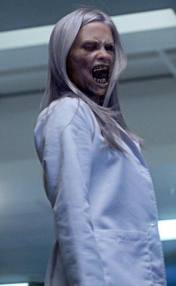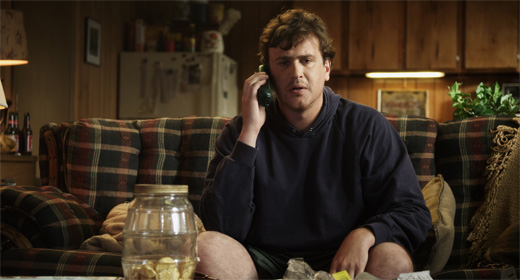
When a music teacher ends up as the main course for a swarm of rats, Nick and Hank suspect a former student may be responsible. Nick discovers that Roddy Geiger is not only a talented musician, he has a strange empathy with rodents, perhaps to the point that he can make them commit murder on his behalf.
Grimm Season 1, Episode 5: “Danse Macabre”
Written by David Greenwalt and Jim Kouf
Directed by David Solomon
Aired Thursday at 9pm on NBC
 The Pied Piper used music to free the citizens of Hamelin from a plague of rats. When they refused to pay, the piper took a terrible revenge, luring all of the children in the city away, into an opening in the nearby hills which closed just as the terrified parents arrived, too late to save all but a single crippled boy. This episode of Grimm attempts to update the tale, leaving the writers to find a modern metaphor for the hypnotic effect of music. Sadly, they plumped for the obvious: a rave. Footage of people waving light sticks always smacks of the faintly ridiculous and while irony is one of Grimm’s strong points, it has to be intentional to work.
The Pied Piper used music to free the citizens of Hamelin from a plague of rats. When they refused to pay, the piper took a terrible revenge, luring all of the children in the city away, into an opening in the nearby hills which closed just as the terrified parents arrived, too late to save all but a single crippled boy. This episode of Grimm attempts to update the tale, leaving the writers to find a modern metaphor for the hypnotic effect of music. Sadly, they plumped for the obvious: a rave. Footage of people waving light sticks always smacks of the faintly ridiculous and while irony is one of Grimm’s strong points, it has to be intentional to work.
 The whole episode has a disjointed, half-thought-through feel, with the string quartet of a music school providing the other musical element for the story. The Chemical Brothers combined with Saint Saëns. The effect is like chasing Red Bull with a nice bottle of claret, which is a pity, because the story of the Pied Piper provides some of the most powerful and disturbing images in the Grimm brothers’ canon: the children dancing into the hillside, the complacent merchants of the town waking to find cribs and beds empty, the crippled boy grief struck because he couldn’t follow. None of these ideas play through into this version, which takes the well worn cliché of rich kids picking on the poor kid as the update of the citizens’ betrayal of their magical pest controller. This wouldn’t matter so much if the character of the piper himself hit the right note, but making him a surly adolescent who is secretly a rat creature called a Reinigen doesn’t so much fail to capture the sinister charisma of the original as miss the point entirely.
The whole episode has a disjointed, half-thought-through feel, with the string quartet of a music school providing the other musical element for the story. The Chemical Brothers combined with Saint Saëns. The effect is like chasing Red Bull with a nice bottle of claret, which is a pity, because the story of the Pied Piper provides some of the most powerful and disturbing images in the Grimm brothers’ canon: the children dancing into the hillside, the complacent merchants of the town waking to find cribs and beds empty, the crippled boy grief struck because he couldn’t follow. None of these ideas play through into this version, which takes the well worn cliché of rich kids picking on the poor kid as the update of the citizens’ betrayal of their magical pest controller. This wouldn’t matter so much if the character of the piper himself hit the right note, but making him a surly adolescent who is secretly a rat creature called a Reinigen doesn’t so much fail to capture the sinister charisma of the original as miss the point entirely.
The scene of Roddy hypnotising his cages of bewhiskered acolytes with violin music is most reminiscent of the mouse tableau vivants from Dinner for Schmucks which probably isn’t the connection the writers wanted to make. Add to this some lazy writing – the scene when Nick and Hank arrive at the scene of the teacher’s death is full of “glad you asked me that” moments – and the episode ranks as the weakest in the series so far. This prompts the question- was this aired on a Thursday, as the first of two consecutive night’s episodes, so it wouldn’t have to carry the show forward for a whole week?
 There are a few saving graces; there are a couple of great scenes with the rats themselves: tiptoeing in the background while Nick and Hank discuss tactics, pouring over helpless victims in an horrible furry stream. In story terms, the setting up of Nick’s partner Hank as a ladies’ man pays off in a wonderfully neat way, when he meets Adalind Schade in a restaurant and is coaxed into buying her dinner. Hank can’t see that Schade is a Hexenbiest and that she’s more interested in using him to get at Nick than getting into his pants, leading to enjoyable speculation about how that plot strand is going to play out. And, like a tiny ball of concentrated sarcasm, Sergeant Wu is for the first time allowed out of the precinct and unleashed on an unsuspecting Portland. The sight of Wu in his civvies, snapping orders at bar staff is more than enough to make the whole show worthwhile.
There are a few saving graces; there are a couple of great scenes with the rats themselves: tiptoeing in the background while Nick and Hank discuss tactics, pouring over helpless victims in an horrible furry stream. In story terms, the setting up of Nick’s partner Hank as a ladies’ man pays off in a wonderfully neat way, when he meets Adalind Schade in a restaurant and is coaxed into buying her dinner. Hank can’t see that Schade is a Hexenbiest and that she’s more interested in using him to get at Nick than getting into his pants, leading to enjoyable speculation about how that plot strand is going to play out. And, like a tiny ball of concentrated sarcasm, Sergeant Wu is for the first time allowed out of the precinct and unleashed on an unsuspecting Portland. The sight of Wu in his civvies, snapping orders at bar staff is more than enough to make the whole show worthwhile.
Cath Murphy




